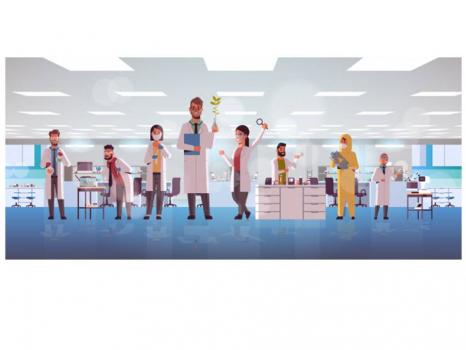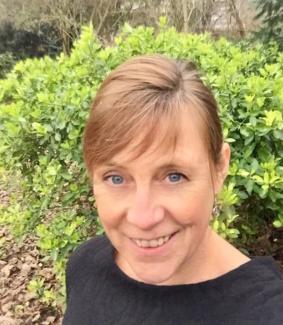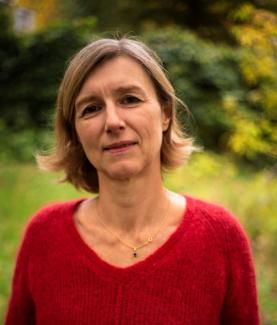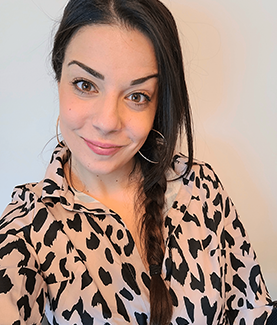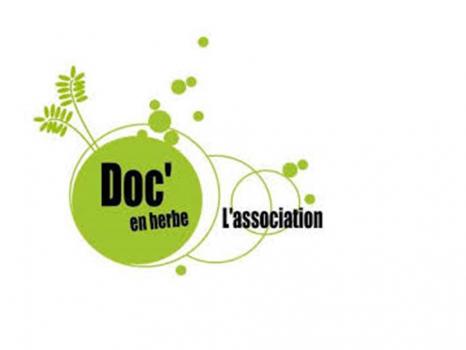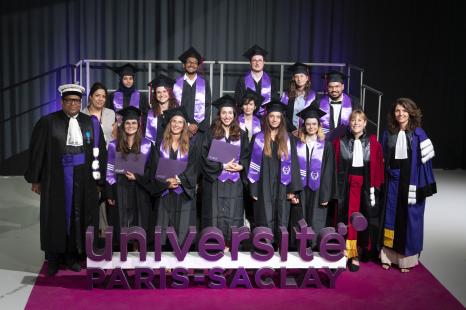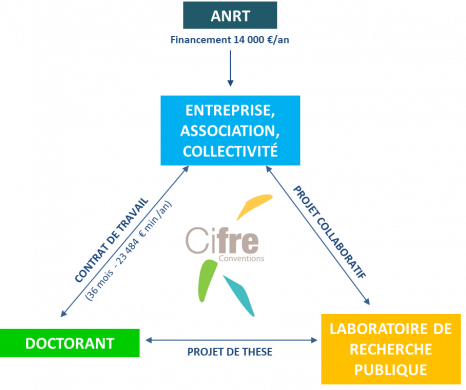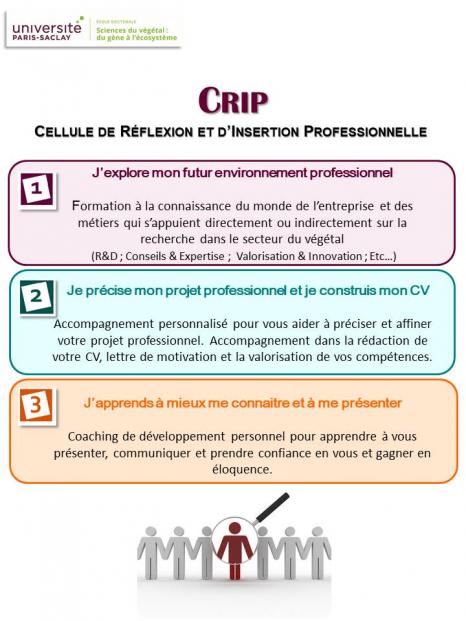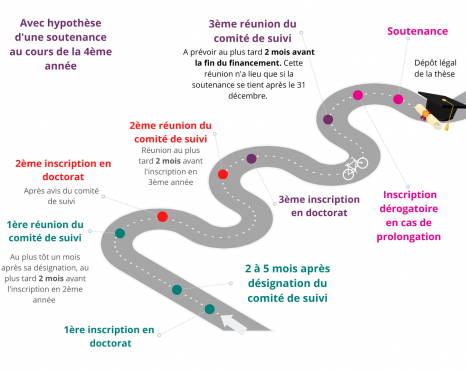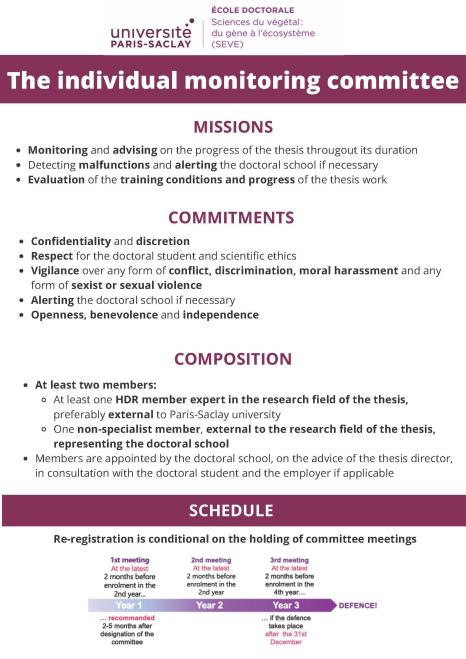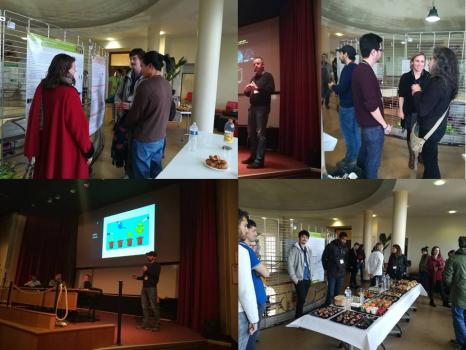
Plant Sciences: from Genes to Ecosystems
The Doctoral School
The Doctoral School "Plant Sciences (SEVE ex-SdV)" offers to graduate students from biology and agronomy studies, a training in and through research in the vast interdisciplinary field of plant research (and beyond by integrating other non-plant models) and all its methodological and analytical approaches.
The themes of ED SEVE are as follows:
→ Morphogenesis and Developmental Biology
→ Responses to Biotic and Abiotic Stresses
→ Genome dynamics and expression
→ Reproductive and Seed Physiology
→ Plant breeding
→ Plant-microorganism interactions
→ Systematics and Evolution
→ Plant Ecophysiology
→ Population and Community Ecology - Functional Ecology
These studies range from gene to ecosystem, using concepts and tools from biochemistry, biophysics, imaging, molecular biology, genetics, genomics, cell biology, modeling and bioinformatics.
Upon completion of the thesis, graduates will receive the degree of "doctor" in one of the following specialties:
- Biology
- Ecology
- Evolution
- Genetics
- Agronomy
- Plant Sciences
- Microbiology
Our host teams
The ED SEVE brings together most of the research teams in the Ile de France area working on these themes within the components of the University of Paris-Saclay (INRAe, CNRS, CEA, UFR des Sciences, University Versailles Saint-Quentin, University of Evry, AgroParisTech) and also some research teams located outside the perimeter of the University of Paris-Saclay, in Paris Intra-muros.
The ED SEVE is part of « Saclay Plant Sciences Graduate School of Research (SPS-GSR) »
Hosted research teams
- BIOGER (BIOlogie et Gestion des Risques en agriculture)
- ESE (Ecologie, Systématique et Évolution)
- EGCE (Evolution, Génomes, Comportement et Ecologie)
- GQE (Génétique Quantitative et Evolution - Le Moulon)
- IJPB (Institut Jean-Pierre Bourgin)
- I2BC (Institut de Biologie Intégrative de la Cellule)
- IPS2 (Institut de Sciences des Plantes de Paris-Saclay)
Who are we ?
The direction of the school
Director: Marianne DELARUE
Email : marianne.delarue@universite-paris-saclay.fr
Adress : Office : 1.53 - Building : 630
Institute of Plant Sciences Paris Saclay (IPS2)
Rue Noetzlin Plateau du Moulon 91190 - Gif-sur-Yvette cedex
Tel. : 01 69 15 33 98
Vice Director : Sophie NADOT
Email : sophie.nadot@universite-paris-saclay.fr
Adress : Ecologie, Systématique et Evolution (ESE)
Building IDEEV 680, 12 route 128, 91190 Gif sur Yvette
Tel. : 01 69 15 56 65
Assistante : Samantha ABGRALL
Email : ecodoc.seve@universite-paris-saclay.fr
Adress: Institute of Plant Sciences Paris Saclay (IPS2)
Office : 1.103- Building 630 "Enseignement" rue Noetzlin Plateau du Moulon
91190 - Gif-sur-Yvette cedex
The Board of the doctoral school
LABORATORY REPRESENTATIVES
- I2BC : Anne-Sophie FIORUCCI, Chloé GIRARD
- ESE : Carmen BESSA-GOMES, Nicolas DELPIERRE, Sophie NADOT, Claire DAMESIN
- IJPB : Benoit ALUNNI, Nicolas ARNAUD, Oumaya BOUCHABKE, Isabelle DEBEAUJON, Eric JENCZEWSKI, Mathilde FAGARD, Rozenn LE HIR, Rajeev KUMAR
- BIOGER : Isabelle FUDAL, Muriel VIAUD
- IBPC-IBENS : Catherine DE VITRY, Clara BOURBOUSSE
- MOULON : Domenica MANICACCI, Clémentine VITTE
- IPS2 : Christine LELANDAIS, Cécile RAYNAUD, Adnane BOUALEM, Ariane GRATIAS-WEIL
- EXTERNAL MEMBERS : David LALOI, Christine BARREAU, Christine DUVAUX-PONTER, julien GASPARINI, Romain VALADE
ENGINEERS : Samantha ABGRALL, Sandrine LE BIHAN
DOCTORAL STUDENTS : they have been elected following the General Assembly of 16/10/2022 and votes by mail.
- Coline AMARO 1Y, I2BC - Titular
- Charlotte CLAPPE 2A, IPS2 - Titular
- Alice CHANTEAU 2Y, IJPB - Alternate
- Suzie DERMINON 3Y, ESE - Titular
- Armand GARCIA 1Y, IJPB - Titular
- Manon LARDOS 3Y, IJPB - Titular
- Amandine LE RUYET 1A, IJPB - Titular
- Oumyma MHAMDI 2Y, IJPB Alternate
- Julie NOAH 3Y BIOGER – Titular
- Mathias PENOT 2Y, IBENS - Titular
- Quentin SAINT MARC 1A, IJPB - Titular
PhD Students Associations : DOC' EN HERBE
The association Doc' en Herbe is a group of happy volunteer PhD Candidates who invest in the running and organization of the Doctoral School “Sciences du Végétal” and who organise regular convivial meetings. The members of the association meet with the direction team of the Doctoral School when necessary to exchange information and let the management team know about the general climate and any problems in preparation for the council meetings, and for working out details of the organization of the PhD-Days and the general assembly.
The elections took place on November, 08th 2023.
- Armand GARCIA : présidente
- Quentin SAINT MARC : vice-présidente
- Pauline SAVOURAT : treasurer
Doc' en herbe's team organizes the PhD Days every year.
What are the PhD Days? These are three exciting days during which you will attend the doctoral school's annual general meeting (you will elect your representatives!), a talk of a prestigious guest speaker and you will have the opportunity to present your research (oral or poster) to the other doctoral school's students. You will also have the opportunity to think about the future during a round table organized with doctors from ED SEVE who now work in the academic research or the private sector!
ADDOC
Act for Doctoral candidates and young DOCtors (ADDOC http://www.addoc.asso.universite-paris-saclay.fr/ ) was first founded in 1995, and reanimated in 2009, for all doctoral candidates and young doctors of all disciplines of the university. ADDOC informs and represents doctoral candidates and young doctors, defending their rights before university and national administrative councils and providing information for the advancement of their careers.
News
General Assembly of the ED SEVE Sciences du Végétal on October 12, 2022 from 2:00 pm to 6:00 pm.
Find the slideshow of the presentation HERE:
Future thesis defenses clic here
Past thesis defences since september 2015 clic here
Regulatory texts
All regulatory texts are available HERE
- Règlement intérieur du Collège doctoral de Paris Saclay - (pdf 901.59 Ko)
- Charte du Doctorat de l'Université Paris Saclay - (pdf 393.19 Ko)
- Decree dated 25th may 2016 relative to doctoral training (NOR: MENS1611139A)
HDR (habilitation to supervise research) and ADR (autorisation à encadrer un doctorant sans HDR) in french and in english
French HDR: Habilitation to Supervise Research
ADR: Autorisation à Diriger un doctorant sans HDR
- How to obtain an HDR? HDR equivalence
- Obtaining an authorization to supervise a doctoral student without an HDR
- Supervising doctoral students, a real job (only in french)
The Cadithe cafés are a place to exchange on difficulties encountered and to share solutions, created for PhD supervisors. You can find the information HERE.
- Training for doctoral supervision
For the past ten years, the Plant Sciences Doctoral School has been organising a very comprehensive training course on doctoral supervision. This training is provided by the service provider Belpaeme Conseil and takes place in 3 sessions of 2 days. The 2021 course is currently underway. This training is open to all the doctoral schools of the University of Paris Saclay, which will be asked to distribute the next training offer to their teams when the time comes.
The University of Paris Saclay also organises training on this theme.
Graduation ceremony
Every year at the end of June, Paris Saclay University holds a doctoral degree award ceremony for doctors who defended their theses during the previous calendar year and at the beginning of the current year.
An invitation is sent to each doctoral graduate, who may bring two guests of their choice.
The Doctoral School "Sciences du Végétal: du gène à l'écosystème" aims at training the best PhD students in our field and to prepare them for a bright future in a more and more competitive world.
PhD
What is a thesis?
The doctoral degree certifies skills acquired through research as part of a doctoral program, which typically lasts three years when the research is conducted on a full-time basis, and three to six years when the thesis is prepared on a part-time basis. The doctoral degree can also be obtained through the validation of prior learning (VAE).
The doctoral degree—the highest internationally recognized higher education degree—is awarded after the defense of a thesis or the presentation of a body of original scientific work.
What is a Doctoral student?
The PhD student is a researcher in training.
A doctoral training programme is a training-by-doing programme based on the doctoral research project, organised by a doctoral school, completed through a professional research experience within a recognised research group.
The doctoral thesis and original scientific work undertaken during the doctorate are defended by the doctoral candidates in an oral presentation. The PhD work takes the form of a dissertation, the thesis, of which the PhD student is the sole author and which is subject to a legal deposit.
The doctorate can be prepared as an initial educational programme, either full-time or as part of a vocational in-service programme. In any case, all scientific, material and financial conditions must be met to ensure the successful completion of the doctoral training project.
We recommend that you first read carefully the sections below, which specify generically the characteristics of doctoral education and what's expected from you. Also check carefully the web pages of the doctoral school that interrests you, to learn about the doctoral school own rules and expectations.
Joining our PhD programs
If you want to join our program, you need to obtain funding or apply for the annual competition. There are a multitude of organizations and institutions that fund doctoral projects.
To be enrolled in a thesis program at the SEVE doctoral school, you must obtain thesis funding for a minimum period of 36 months. There are several sources of funding, detailed on the page below:
https://www.universite-paris-saclay.fr/en/research/doctorate/before/funding
CIFRE Scholarships
CIFREs are partnerships between industry and the public research sector. The thesis takes 3 years and places the doctoral candidate at the public-private sector interface. The ANRT (Association Nationale Recherche Autonomie) coordinates CIFREs.
International joint PhD program (Cotutelle)
A thesis can be carried out in cooperation between two countries, with a supervisor from each. This requires a formal agreement between the universities in the two countries. The thesis is then carried out following these criteria:
– the doctoral candidate is under cosupervision;
– the thesis work is carried out in in both places;
– the language of the dissertation is fixed by the formal agreement;
– there is a single oral defence in one of the countries, fixed by the formal agreement, but the doctor receives two doctoral diplomas.
International Relations of University Paris-Saclay provides some financial support for doctoral candidates carrying out a thesis in "cotutelle".
ADMISSION to Doctoral School of Plant Sciences
- To be able to register for a PhD at the Doctoral School of Plant Sciences of the University of Paris-Saclay, it is first necessary to obtain an admission conditional on a funding, for the entire duration of the PhD (36 months minimum except in the case of cotutelle), in order to carry out a thesis project within a research team affiliated to the ED.
- The result of an admissibility interview, organized by the doctoral school management, to verify the applicant's suitability for the project for which he or she is applying.
The schedule for upcoming hinterviews is indicated below:
11/20/2025
01/09/2026
02/27/2026
04/16/2026
06/09/2026 to 06/11/2026 = Annual competition
06/25/2026
09/11/2026
This admission can be done by several ways:
- The COMPETITION for access to the Ministry's doctoral contracts organized by the Doctoral School and held each year in June. The subjects and application procedures are detailed below for 2024 session: "Competition of the ED SEVE WHITE PROGRAM GS-BIOSPHERA"
- DIFFERENT RECRUITMENT PROGRAMS are also held at different times of the year, for example the CSC Chinese Scholarship Council, the ENS normaliens programs, the ADI cotutelles (Actions Doctorales Internationales), etc... The calls for applications can be consulted via this link
- THE WAY OUT OF COMPETITION on own funding acquired by the laboratories (ANR, ERC, etc...): applications directly to the laboratories then interview with the Doctoral School Management.
- For candidates who have their OWN FUNDING (cotutelle, Eiffel grant, etc...), contact directly a potential supervisor of the laboratories affiliated to our ED in order to build together a thesis project.
The thesis topics of the different recruitment programs are available via this link
COMPETITION 2025
The annual ED SEVE competition is part of the Université Paris-Saclay's ‘BIOSPHERA Graduate School white programme’.
As part of its missions, the SEVE ED has set up a doctoral student selection process, based on explicit and public criteria and which is part of the policy of the ED's partner establishments for the allocation of doctoral contracts allocated by the Ministry of Higher Education, Research and Innovation (MESRI) to the University of Paris-Saclay.
This year, 9 doctoral contracts will be awarded. Projects will be submitted online from 10 March 2025.
The competition is open to anyone who has completed a Master's degree or equivalent before 1 October 2025, the start date of the contract. It is only possible to take part in this competition with the agreement and support of the thesis project leader, who must be contacted.
Attention
- A candidate may only apply for a maximum of 5 projects
- A project leader may submit only one candidate to the competition and a candidate may submit only one subject to the competition.
- The application deadline in ADUM is specific to each subject.
- Maximum date: midnight on 7 May 2025.
Composition of the 2025 jury
| BONNOT | Clémence |
| BOULANGER | Alice |
| CHARRIER | Bénédicte |
| DELARUE | Marianne |
| DELERIS | Angélique |
| DEVEAUX | Yves |
| GIRARD | Chloé |
| LEFEVBRE | Valérie |
| MEDIENNE | Safia |
| VASSEUR | François |
| VAULTIER | Marie-Noëlle |
Candidates consult our Doctoral School's proposals for thesis subjects and apply for the subject(s) they are interested in by selecting the criteria:
‘By type of funding:’ ED contracts: GS-BioSphERA white programme ;
‘By doctoral school: ‘Plant Sciences: from gene to ecosystem.
- You must create an application space to manage and monitor your application for the chosen subject.
- You will enter various information (marital status, diplomas, languages, professional and research experience, etc.).
- In the ‘Motivations’ tab, you should enter your cover letter using the template provided in ADUM (Explain why you want to work on a thesis, and in particular on the subject selected. What do you expect from training through research?)
- In the ‘Additional information’ tab, fill in the information requested.
- In the ‘Space for submitting the application file containing the requested documents compiled in a single PDF’ tab.
Please upload a single pdf file containing :
- CV with photo
- A covering letter following the model indicated in ADUM
- A description of a research project (maximum 3 pages) chosen from among those carried out during your training. This summary should briefly present the scientific questions, the methods used, the main results and conclusions if already available (you may include diagrams and figures).
- Transcripts of Master's or equivalent marks in your possession, indicating rank or classification (Master's marks obtained late may be sent to ecodoc.seve@universite-paris-saclay.fr up to the day before the audition).
- Copies of diplomas obtained (or other language certification, for example).
To finalise your application
You must finalise your application by clicking on the ‘submit my application’ button.
Enrolment in our Doctoral School consists of 3 phases:
- admission
- pedagogical registration
- administrative registration
https://www.universite-paris-saclay.fr/en/research/doctorate/registration-and-re-registration
For new foreign doctoral students: contact the GATE (“Guichet Accueil des Talents Etrangers”) to help you with your administrative procedures.
https://gate.paris-saclay.fr/en/
ADMISSION
What framework for my PhD? information here
The doctorate can be obtained in 3 different settings.
The registration fees are identical in all 3 cases.
Registration for initial training is done in continuity with a master's degree or other training leading to a master's degree.
In initial training, the doctorate is prepared on a full-time basis. The initial duration of the thesis preparation is 3 years. Beyond 3 years, extensions of the thesis preparation period are possible, as an exception.
Funding dedicated to the preparation of the thesis is required for an initial training registration. The reference amount of this financing corresponds to the remuneration of the doctoral contract under public law and the minimum amount is the SMIC.
Exemptions from this funding threshold may be requested from the head of the institution.
Registration for lifelong learning concerns two categories of people:
- Those who obtained their last higher education diploma more than one year before the desired date of first registration in a doctoral program (whether the thesis is prepared full-time or part-time and whatever the conditions of financing envisaged);
- Those who plan to prepare their thesis in parallel with a main activity other than the preparation of the thesis, whatever the date of obtaining their last diploma. The main activity is understood as the one that brings more than half of the income (this category includes the cases of candidates without income from activity)
In lifelong learning, the doctorate can be prepared on a part-time basis. The duration initially set for the preparation of the thesis depends on the time that can be devoted to the preparation of the thesis and is between 3 and 6 years. A derogation must be requested to extend the thesis beyond the initial duration. In other words, no derogation will be requested before the end of the duration of the thesis initially set whether it is 3, 4, 5 or 6 years.
In all cases, no funding is required for the preparation of the thesis, but an FTLV commission ensures, before the first registration in the doctoral program, that the material and financial conditions are met for the proper preparation of the thesis.
The doctoral degree is awarded after the defense of a thesis or the presentation of a body of original scientific work.
Unlike registration in the IF or FTLV programs, registration for a doctorate in the VAE program is done when the original scientific work constitutes a coherent whole that allows for a defense. It may have been carried out entirely outside the academic framework or with a formalized link, for example, by a voluntary research agreement with a laboratory.
Initial training PhD at Plant Sciences: from Genes to Ecosystems Doctoral School
To be able to register, it is first necessary to obtain an admission conditional on a funding, for the entire duration of the PhD (36 months minimum except in the case of cotutelle), in order to carry out a thesis project within a research team affiliated to the ED.
This admission can be done by several ways:
- The COMPETITION for access to the Ministry's doctoral contracts organised by the Doctoral School and which takes place every year in June. The subjects and application modalities are detailed in the section “COMPETITION AND SUBJECTS OF THESIS "
- The WAY OUT OF COMPETITION: interview with the Direction of the Doctoral School and/or its council, along the year, according to the proposals of financed projects.
Funding is sometimes associated with a thesis subject proposed by a laboratory, in other cases it is up to the doctoral student to take the necessary steps to obtain one.
If you have such funding (CIFRE, Cotutelle, Eiffel scholarship, etc.), you can contact directly a potential supervisor of laboratories affiliated to our ED in order to build together a thesis project.
The different sources of funding for theses are listed HERE.
PEDAGOGICAL REGISTRATIONS AND RE-REGISTRATIONS
Registrations/re-registrations at the Doctoral School are dematerialised.
STEP 1: FILL IN ADUM INFORMATIONS ABOUT THE DOCTORAL STUDENT AND HIS OR HER THESES
The registrations/re-registrations for the year 2025/2026 are open from June 1st, 2025.
For re-registrations, please connect directly to your ADUM personal space.
| You passed the competition of the ED | You did not pass the competition of the ED |
Login to your ADUM space: |
Create your ADUM account: https:///www.adum.fr/index.pl?site=PSaclay
|
Please fill in all the fields CAREFULLY, even if they are not obligatory (without *). If the file is not filled in correctly, it will not be validated by the Doctoral School and you will not be able to register.
For all of you: after filling in all the sections and uploading the .pdf with all the supporting documents, you must click on "I am finalising the procedure" in order to start the automatic circuit for dematerialised signatures.
You will need to read the Doctoral Charter and commit yourself by signing it on ADUM.
Enrolment in 1st year of thesis : Application deadline 15 May, 2026
Documents to be deposited on ADUM: to be scanned to create a single PDF file that will be uploaded in the "Documents to be attached" section, in addition to your recent photo to be deposited on ADUM in the reserved area.
- certificate of payment or exemption CVEC (Academy of Versailles)*
- photocopy of the French diploma or certificate of completion of the master's degree (or diploma conferring an equivalent degree)
- or, for non-French diplomas: a detailed CV, transcripts and list of courses taken, a photocopy of the last diploma obtained
- copy of your national identity card or passport ( and a valid residence permit or visa for foreigners from outside Europe or the receipt for an appointment to obtain a residence permit))
- proof of funding for your thesis (work contract, scholarship certificate, doctoral contract, etc.) Exception: 1st years who benefit from a doctoral contract for which the employeer is University Paris-Saclay (admitted following ED competition, handicap contract, ENS...) and who have not yet received it, do not have to provide this document.
- in the case of cotutelle: provide the signed cotutelle agreement and the certificate of enrolment in the other establishment if you already have it
- certificate of public liability insurance for the current year ( (until the end of August of the following year)
* INFOS CVEC (student life and campus contribution): compulsory contribution of 103€ for all. Choose the Academy of Versailles you depend on https://cvec.etudiant.gouv.fr/.
Don't forget to download your certificate.
If you are exempt from CVEC (e.g. co-supervision and exemption from fees in 2025/2026 according to your agreement), please download your CVEC exemption certificate which must also be provided.
A few tips for filling out some sections in ADUM
- In the tab "Administrative attachment": ask your thesis director to which CNU section he or she belongs (between 64 and 69).
- In the tab "Course of the thesis" no need to inform the "Parrain de thèse".
Re-registrations in 2nd and 3rd year of thesis : deadline October 31, 2025 whatever the start date of the thesis
Documents to be deposited on ADUM: to be scanned to form a single PDF file that will be uploaded in the section "Documents to be attached", in addition to your recent photo to be deposited on ADUM in the reserved area.
- certificate of payment or exemption CVEC (Academy of Versailles)
- proof of funding for your thesis (work contract, scholarship certificate, doctoral contract, etc.)
- certificate of liability insurance for the current year (until the end of August of the following year)
- Report of your last individual thesis monitoring committee (CSI): form signed and dated by the members of the committee plus summary written by the doctoral student (see HERE) that you must download in the tab "Individual monitoring committee".
Please note: the university transfer form is only required for re-registration in the 2nd and 3rd year if you come from a university other than Paris Saclay
A few tips for filling out some sections in ADUM
- In the tab "Skills and Portfolio" please fill in all the relevant boxes for you, for example :
o heading "technical skills" or "transversal skills" if you have acquired new ones during your thesis.
o section "Professional experiences or internships" if you have spent time in other labs or participated in conferences, workshops, etc.
o heading "teaching done" if you are doing or have done a doctoral mission for example
- In the section "Individual monitoring committee" you have to indicate the names of all the members of your thesis committee, including those from outside the Doctoral School. Do not forget to submit the post-committee report as well as the follow-up sheet of your last thesis committee.
Re-enrolment in 4th year and up:
Doctoral students who defend their thesis before 31/12/2025 do not register and do not pay neither the fees nor the CVEC. They must have declared their defense and submitted their manuscript (1st submission) before 30/11/2025.
- For registration beyond the 3rd year, in addition to the usual documents required for re-enrollment, proof of thesis funding and a favorable opinion from the 3rd monitoring committee are required to justify this exemption.
STEP 2: ELECTRONIC SIGNATURES AND INDIVIDUAL INTERVIEWS
Once ADUM has been filled in with the supporting documents, the pedagogical registration can be proposed by the ED. For this it is necessary to obtain electronic signatures:
- The thesis supervisor
- The director of the research unit
- From the direction of the ED
The electronic signature of the ED is conditional to an individual interview either with Marianne Delarue (marianne.delarue@universite-paris-saclay.fr) or with Sophie Nadot (sophie.nadot@universite-paris-saclay.fr) during which the progress of the thesis and the professional project of the doctoral student will be exposed.
The dematerialized registration procedure integrates the "signature" by the actors concerned of the Doctoral Charter (1st registration - doctoral student and thesis director) and of the individual training agreement (1st registration and re-registration - doctoral student, thesis director, research unit director).
ADMINISTRATIVE REGISTRATIONS AND RE-REGISTRATIONS
The administrative registration is done in connection with the scolar services of the UFR des Sciences de l'Université Paris-Saclay: scolarite-doctorat.sciences@universite-paris-saclay.fr (Maison du doctorat - ENS Paris-Saclay, 4 avenue des Sciences, 91190 Gif/Yvette ).
This registration is dematerialized on the ADUM website.
The list of documents required for this administrative registration is available on the link below:
We advise you to upload the same .PDF as for the pedagogical registration.
Once the documents have been uploaded in the dedicated space and the registration agreement of the doctoral school obtained, you can proceed to the online payment of the tuition fees of 391€.
You will then be able to obtain your school certificate on your ADUM space
Student cards:
PhD students enrolled in the 1st year will receive a student card via the ED that will be valid until the end of December 2025. Ask the assistant for the date of edition.
Doctoral students who are re-enrolled in 2nd, 3rd year and more will receive an email to download their dematerialized card for 2025/2026 on their smartphone. Please keep the physical card issued last year, which will be required for access to the library, for example. Doctoral students who do not have a smartphone will have to apply for a physical card for 2025/2026.
General Informations
Doctoral training consists of training through anf for research (acquired through the completion of the thesis project) supplemented by additional training enabling the doctoral student to acquire a set of professional and personal skills. Once graduated, the young doctor is a professional whose skills, acquired through doctoral training, can be used in many sectors of activity, whether or not related to research.
The doctoral student must acquire a certain number of competences to validate his/her doctoral training, for a total of 180 points or credits.
Of these 180 points, 155 are acquired through the completion of the thesis project, and 25 must be acquired through additional training or activities which must be balanced, if possible, within 3 skill blocks:
- Designing a research process
- Doing, Doing-Doing and Collaborating
- Share
Below you will find a table to be filled in to help in the follow-up of the training courses and indicating the number of points acquired
How to choose and find your courses?
1 - Mandatories courses
3 training courses are compulsory during the PhD:
- Research ethics and scientific integrity
Any courses are available in face-to-face or MOOC form, in French or English:
A MOOC proposed by the University of Paris-Saclay is available via ADUM (sessions open every 3 months)
A general directory of doctoral training in scientific integrity is also available HERE.
- Open science issues
Training courses are available in your ADUM space
- Sustainable development.
Training courses are available in your ADUM space
- Acting against gender-based and sexual violence (VSS)
A module is available for all doctoral students on eCampus.
Re-enrolment in the second year of the PhD programme will only be permitted if two of the four compulsory training courses have been completed.
No thesis defence will be permitted unless all four compulsory training courses have been completed.
The doctoral student must acquire a certain number of skills to validate his or her doctoral training, for a total of 180 points or credits. Of these 180 points, 155 are acquired through the completion of the thesis project, and 25 must be acquired through various training courses or activities which may consist of scientific and technical courses or seminars (see the training catalogue in Adum). Participation in conferences or summer schools may, in some cases, also be considered as complementary training after discussion with the doctoral school. A teaching or scientific mediation activity is considered as part of the complementary training allowing to acquire part of the competences required for the PhD degree, as well as participation to boards or committees, and associative involvement.
To help you manage your training plan and balance it to cover all the required skills, you can download this file below:
It has two tabs: in the first tab you will find a table that will help you calculate your training points and identify for each type of training/activity the skills acquired; in the second tab you will find the list of skill blocks required for doctoral training.
When you register for a course/training via Adum your points are automatically calculated. For all other training/activities, you will need to enter this information in ADUM, under the heading "Off-catalogue training", and provide a certificate of attendance or any supporting document. The doctoral school will then validate this training/activity with the corresponding number of credits.
Training courses offered to doctoral students by the Université Paris-Saclay
The catalogue of doctoral training courses is available on the University of Paris-Saclay website via this link and also via your personal ADUM space in the "Training" section.
You can also take part in the training courses provided by the Centre d'Alembert of the University of Paris Saclay http://www.centre-dalembert.universite-paris-saclay.fr/
Similarly, all the training courses offered by the ED 227 of the "National Museum of Natural History" are open to you (see catalogue below)
The Plant Sciences doctoral school, anxious to provide its doctoral students with the best possible training, has set up several training courses for which you have priority:
- How to write paper ?
- How to find a post-doc?
- Stres management
- Awareness of the challenges of the ecological transition in the professional environment.
- RNAseq analysis
- Genome annotation
You also have access to systems to prepare you for a career in the public and private sectors (e.g. Cellule de Reflexion à l'Insertion Professionnelle (CRIP), Doctopreneuriales, etc.)
Thinking on professional integration unit
In order to support you in your professional project, we would like to set up a Thinking Cell on Professional Integration (the CRIP!) within the SEVE doctoral school.
We would like to provide you with specific training in Plant Sciences combined with individualised support from professionals in the sector.
The multiple objectives of this training are to provide you with a better knowledge of the company and the socio-economic context of the professional sectors that could be of interest to you (module 1); to help you specify and refine your professional project and accompany you in the writing of your CV and cover letter (module 2) and finally to provide you with keys to personal development (seriously: not thanks to incantations or gurus ;-) to get to know yourself better and develop self-esteem (module 3). All this is summarised in the attached brochure.
This teaching will be delivered in French, and will take place over 3 modules of 3 hours, each one a few weeks apart (from March to June 2021), and will be associated with essential personal work. It will be counted as 20 hours in your compulsory additional training hours.
Free but compulsory registration via ADUM
Training to Ethics and Scientific Integrity
"Assessment and proposals for the implementation of the National Charter of Scientific Integrity", several decisions were taken, in particular :
- doctoral schools must ensure that doctoral students receive training in ethics and scientific integrity,
- the institutions have appointed a referent for scientific integrity,
- a French Office of Scientific Integrity (OFIS) was installed in 2017 at HCERES.
Many training courses are available in face-to-face or MOOC format, in French or English.
A MOOC is proposed by the University of Paris-Saclay and is available via ADUM (open sessions every 3 months)
A general directory of doctoral training courses in scientific integrity is available HERE.
Regional Unit for Training in Scientific and Technical Information
URFIST of Paris offers doctoral training :
http://urfist.chartes.psl.eu/tags/formations
Collège de France
Our agreement with the “Collège de France" allows doctoral students access to courses, seminars, colloquia and conferences.
Institut Curie courses
THE INDIVIDUAL MONITORING COMMITTEE
Thesis individual monitoring committee
The monitoring committee guide is available here (soon translated into English):
Guide of the Individual Monitoring Committee
The implementation of the "Individual Monitoring Committee" ("IMC") is made compulsory by the ministerial order of 25 May 2016, which stipulates: "An individual thesis monitoring committee ensures the smooth running of the programme on the basis of the doctoral charter and the training agreement. The thesis monitoring committee does not replace the doctoral supervision teams, but acts as a complement to them, offering a neutral and external point of view on the progress of the doctoral project, which each party can make constructive use of".
In other words, the purpose of this committee is to ensure that you have really taken ownership of the subject by clearly identifying the scientific question and the underlying issues and hypotheses, and that you are making progress in designing and planning the work to be done. In addition, these committees can provide you with solutions to practical problems as well as interesting insights.
The committee is an opportunity for you to present your work to an external audience in an informal, interactive and constructive manner. This should not replace a team seminar or laboratory meeting : the presentation and discussions should be conducted only in the presence of the members of the monitoring committee whose composition will have been validated by the doctoral school.
We require the supervisors to absent themselves at the end of the meeting so that the candidate can have a private chat with only the committee members. The supervisor will also have a private word with the committee to give his/her opinion about the doctoral student and how the thesis is going on. These private interviews give the opportunity to deliver messages to the persons concerned and also to the Doctoral School in case of problems.
The composition, organisation and functioning of the monitoring committee have been determined by the board of the Doctoral School:
- We ask that at least 2 monitoring committees are held during the thesis period (this can be 3 in case of difficulties or re-registration in 4th year). The holding of these committees is necessary for the re-registration. They must take place at least 2 months before the re-registration.
- The committee must be composed of 2 or 3 external personalities of the thesis project of which at least one member must be external to the ED SEVE and at least one member must be HDR. Committee's members cannot be chosen as thesis reviewers and only one member of the jury may be an examiner. The committee must also include a representative from the doctoral school (listed below) considered as a "non-specialist member from outside the research field".
- COMMITTEE MEMBERSHIP MUST BE APPROVED BY THE DOCTORAL SCHOOL. Please send us the list of the proposed members, with their contact details (email addresses), and the date of the committees as soon as it is fixed (at the latest 2 weeks before the committee by email to: ecodoc.seve@universite-paris-saclay.fr). Participation by videoconference is accepted for external members.
- No later than 48 hours before the date of your committee meeting, you should plan to send the monitoring committee booklet (downloadable below) to the committee members, together with your progress report summarising your work and the portfolio of skills.
MONITORING COMMITTEE BOOKLET TO BE COMPLETED
- At the end of the committee, the members of the committee indicate their remarks and conclusions.
- 2nd and 3rd year doctoral students can continue to fill in the old booklet already filled in during the previous committees
Committee representative of the Doctoral School SEVE:
- IJPB: Benoit Alunni, Nicolas Arnaud, Oumaya Bouchabke, Françoise Budar, Michèle Cren-Reisdorf, Isabelle Debeaujon, Eric Jenczewski, Rozenn Le Hir
- IPS2: Jean Colcombet, Florian Frugier, Valérie Geffroy, Olivier Martin, Pascal Ratet, Cécile Raynaud
- BIOGER: Isabelle Fudal, Thierry Marcel, Thierry Rouxel, Jessica Soyer, Muriel Viaud
- ESE: Nicolas Delpierre, Sophie Nadot, Jacqui Shykoff
- GQE le Moulon: Timothée Flutre, Domenica Maniccaci, Isabelle Goldringer, Jérôme Enjalbert, Amandine Cornille, Christine Dillmann.
-I2BC: Anne-Sophie Fiorucci, Chloé Girard
- Paris: Marianne Delarue
THESIS REFERENT
The mission of thesis sponsors (or thesis referents in the case of the IJPB) is to support doctoral students throughout their thesis in all non-scientific matters (a mission devolved to the management and the individual thesis monitoring committee).
The completion of a thesis can sometimes be anxiety-provoking, and the main aim is to prevent any psycho-social risks during the doctorate. The sponsors are identified as resource people to whom you can confide in complete freedom and confidentiality, and whose mission is to :
- Provide personalized, close, informal, neutral, discreet and benevolent support.
- Remind you of important deadlines during the 3 years of your thesis (follow-up committee, re-registration, thesis defense, etc.).
- To guide them in their choice of training courses and the use of their skills portfolio, so as to best anticipate the post-thesis period and the direction of their career.
- To be attentive and attentive in order to avoid and prevent all psycho-social risks. To try to provide solutions by guiding you towards the appropriate resource people and/or by proposing adapted solutions if possible.
- Act as a relay with the ED management if the situation so requires.
This follow-up will take place at least once a year. Ideally, you should choose someone from the same laboratory or institute, but outside your team. This could, but need not, be the same person as the ED representative on the follow-up committees.
The list of sponsors is available in the document below:
SKILLS PORTFOLIO
The main part of the doctoral activity consists of innovative, time-limited research work, supervised by a director, within a research unit. The doctorate is characterised by the production of new knowledge in an international context, as well as the dissemination of this knowledge, for example through teaching or written and oral communications to other specialists. The doctorate concludes with the writing of a thesis and its defence, i.e. a synthetic restitution of the scientific work carried out, validated by the scientific community.
The doctorate is also a period of increasing competence. Doctors of course have expertise in the thematic field they have explored, but also cross-disciplinary skills that can be transferred to other activities. The highest level of the National Qualifications Framework, to which the doctorate is attached, states that graduates are able to "identify and solve complex and new problems involving a plurality of fields, by mobilising the most advanced knowledge and know-how; design and steer research and innovation projects and processes; make innovative contributions in the context of high-level exchanges and in international contexts". Moreover, as each professional experience is individual, each doctor has developed all the skills related to the PhD, and each of them with more or less master's degree.
Faced with the current competition on the labour market, for doctors, who can pursue all types of careers, it is necessary to identify their skills, to know how to name them and to talk about them. Knowing how to name them in different ways is particularly useful in order to adapt to the person you are talking to, for example according to the proximity you have with them, their knowledge of the doctorate, the specific vocabulary they use in their activities or the profile sought by a recruiter.
In order to identify these competences, we propose a self-assessment tool based on the National Directory of Professional Certification (RNCP) concerning the doctoral degree. This tool, which you will be able to implement throughout your thesis, should enable you to better identify your acquired competences and your needs for reinforcement during your thesis but also throughout your professional career.
It will also enable you to add to your CV.
2 possibilities to fill in your skills book:
1 - A digital option via the DocPro website.
Thanks to a free registration, you can create your own digital notebook that you can modify and consult whenever you wish.
2 - A classic option via a .doc form
ANNUAL MEETINGS
The General Assembly
Every year, in October or November, the Doctoral School organizes a general meeting for doctoral students, their supervisors and researchers attached to our ED. The Director presents the missions of the ED and the ED Council, the progress of a thesis as well as the rights and obligations of each doctoral student and supervisor.
At the end of this general assembly, a vote is held to elect the doctoral students' representatives to the Council of DE.
The PhD Days
PhD Days are usually held after the General Assembly.
What's PhD Days? They are 2 hectic days, organized by your “Doc en Herbe” association, during which you will attend seminars of prestigious scientists and where you will have the opportunity to present your work (oral or poster) to the other PhD students of ED. The presentation of a talk or a poster is optional for 1st year doctoral students, but mandatory for 2nd and 3rd year doctoral students.
You will also have the opportunity to think about the future during a round table discussion with ED567 doctors who are now working in public research or in the private sector. They will present their career paths, the advantage of a PhD and lots of advice from alumni.
Thus, the PhD days are a great opportunity:
- To hear, meet and discuss with leading researchers recognized in their field who come especially to meet you.
- To present your thesis work in an informal and less stressful setting than at large international meetings. The best way to train yourself to present your results, either through a poster or a presentation.
- To meet former doctoral students from the doctoral school explaining their professional career path outside of academic careers
- To meet your colleagues from the doctoral school, to get to know each other better, to create a scientific or personal network and more.
- To relax, to share a convivial moment, to discover many different cultures within more than 20 different nationalities of doctoral students.
Attendance at the General Assembly as well as at the PhD Days is mandatory and valued in hours of training by the ED. It will be credited to your mandatory 100-hour training account during your thesis.
PhD Graduation ceremony
Every year, at the end of June, the University Paris Saclay organizes a doctoral graduation ceremony for the doctors who have supported the previous calendar year and the beginning of the current year.
An invitation is sent to each graduating doctor who can come accompanied by two people of his or her choice.
Eligibility requirements and practical information https://www.universite-paris-saclay.fr/en/news/2020-phd-graduation-ceremony
- General Information
- Jury Validation
- Deposit and distribution of the thesis
- The thesis defense
- Confidentiality and dissemination of the thesis
- Recovering your diploma & FAQ
GENERAL INFORMATION
All information concerning the thesis defense procedure is available on the University's website HERE, and in the defense guide:
As in most Doctoral Schools, we ask that the thesis work has been valorised by at least one publication, in a peer-reviewed journal, signed as first author by the doctoral student (or a patent). In the opposite case, the possible valorisation of the thesis in the 12 months following the defence will have to be rigorously evaluated by the two rapporteurs in order to obtain an exemption to this rule.
JURY VALIDATION
The jury must be designated in ADUM, 2 MONTHS BEFORE THE SUPPORT or 3 MONTHS if confidentiality is requested
STEP 1: Validation of the jury
- The composition of your thesis jury must be validated by Sophie NADOT (sophie.nadot@universite-paris-saclay.fr)
- Composition of a thesis jury (detailed explanations HERE )
The jury is composed of 4 to 6 members including 2 "rapporteurs" who:
- Must be authorized to direct research (HDR) or equivalent for foreign personalities.
- Must be external to the University Paris-Saclay AND the doctoral school.
- Must not be co-authors of publications with the doctoral student or be a member of the doctoral student's monitoring thesis committee.
- At least half of the jury is composed of professors or equivalent (research directors).
- At least half of the jury is composed of members from outside the University of Paris-Saclay AND the doctoral school.
- The jury must have a balanced representation of men and women.
- The chairman of the jury is appointed by the jury itself. He or she must be a University Professor or equivalent and cannot be the thesis director.
In summary:
The Jury
(* Members with voting rights)
4 to 6 doctors, including the supervisor
*≥ 50% University professors or equivalent (recommended: at least 1 University professor)
*≥ 50% external to the thesis (institution & doctoral school)
At least 1 woman, at least 1 man
Once you have the list of your jury members, please download the spreadsheet below, fill it in (french=first tab, english=second tab) and email it to Sophie Nadot.
STEP 2: Désignation du jury dans ADUM
Once the jury has validated
- Its composition must be indicated in your ADUM space: in the "Procedures" menu, choose "I defend my thesis within 2 months". Fill in all the information relative to the defense.
- You should indicate the title of the thesis in English and French,
- the abstract in English and French (4000 characters maximum, including spaces),
- keywords in English and French,
- Once completed, an email will be automatically sent to the thesis director and to the Doctoral School
DEPOSIT AND DISTRIBUTION OF THE THESIS
- Do not confuse confidentiality and embargo: confidentiality requires a special procedure, it is used in case of very sensitive data and requires the authorization of the University's presidency. The embargo is just a delay for the publication of the thesis.
The explanations are available on this page:
Uploading of the manuscript, submission of the thesis and thesis reports
STEP 1: 1st deposit (between 3 months and 1 month before the defense)
- The version of the manuscript that will be sent to the jury must be uploaded in your ADUM space at the latest 6 weeks before the thesis defense.
- If the thesis is not written in French, it is necessary to include in the manuscript, at the place you wish, an abstract of 4000 characters minimum including spaces.
- Then, you must make an appointment with the university library, which can be reached by email at theses-sciences.scd@universite-paris-saclay.fr. This step is mandatory to be able to defend your thesis. It is this action that automatically generates the NNT and allows you to have access to the minutes of the defense in ADUM.
- The Library will inform the doctoral student on issues related to the rights and duties of an author, on the legal deposit of a work (the thesis) and its electronic dissemination, on the dissemination of personal data and on other issues related to the deposit of the thesis and to become aware of the general and specific conditions of dissemination of his/her thesis.
- For your information, the rapporteurs must file their report in ADUM at least 20 days before the date of the defense.
STEP 2 : 2nd final electronic submission of the manuscript
Information concerning the distribution of the thesis manuscript is available on this page:
This step is mandatory to obtain the certificate of completion of the diploma
- Within 1 month for minor corrections left under the responsibility of the doctor or 3 months for major corrections
- Even if the jury has not requested corrections and even if the author has no corrections to make, this second deposit is necessary and mandatory to specify the name of the jury president on the cover page. Make the 2nd deposit of the manuscript on ADUM and contact the Library for validation.
- If the jury has requested major corrections to the thesis, the doctoral student makes the changes and submits the new version of the thesis to the jury member in charge of checking them. The jury member completes the certificate of verification of major corrections and gives it to the doctoral student.
- The doctoral student submits the final version of his/her thesis in PDF format in his/her personal ADUM space and contacts the library for validation.
- Do not forget, in all cases, to complete the application for the manufacture of a diploma.
THE THESIS DEFENSE
- You will print from your ADUM account the form "Procès Verbal de défense de doctorat" that you will give to the president of the jury during your defense.
- The duration of the oral presentation is generally 45 minutes. It is followed by questions from the Jury.
- In its deliberations, the jury appreciates the quality of the doctoral student's work, its innovative character, the doctoral student's ability to situate it in its scientific context, as well as his or her exhibition skills.
- At the end of the defense, the jury completes and signs the minutes and the doctoral defense report.
- If one of the members participated in the defense by videoconference, the president of the Jury signs the minutes and the defense report on behalf of the member not physically present.
- If the jury asks the candidate to make major corrections to his/her thesis, the jury president completes and signs the letter of designation of the jury member in charge of checking the modifications and gives it to this jury member along with the certificate of verification of the corrections. In this case, the doctoral student has 3 months to make the corrections.
The president of the jury, or, failing that, a member of the jury designated by the president of the jury, or the thesis director sends a copy of the minutes of the doctoral defence, duly completed and signed, as well as the signed proxies if the defence took place by total or hybrid videoconference, to the Scolarité Office ( scolarite-doctorat.sciences@universite-paris-saclay.fr ) and sends all the originals to the Maison du doctorat, ENS Paris Saclay, Documents de soutenance, 4 avenue des Sciences, 91190 Gif sur Yvette
The submission can also be made by the doctoral student.
A copy of the minutes of the defence must be given to the doctoral student
Videoconference defense: please read the instructions in the document "Notes visio"
CONFIDENTIALITY AND IN CLOSED DOOR
Do not confuse confidentiality and embargo: confidentiality requires a special procedure, it is used in case of very sensitive data and requires the authorization of the University's presidency. The embargo is just a delay for the publication of the thesis.
The explanations are available on this page:
3 months before the defense and before any distribution of the manuscript (even to the rapporteurs)
To make a request for confidential classification of the thesis (and if necessary a closed defense) to the Presidency of Paris Saclay University. This request must be justified by at least one supporting document (copy of a confidentiality agreement with a partner or copy of an ethical opinion on a protocol providing for the commitment of confidentiality).
Request for confidential classification of the thesis and, if necessary for a waiver of the public nature of the defense (in closed door)
Form to be signed by the jury and the public if the defense is not held in closed door
Sample Confidentiality Agreement Jury & Reviewers
Sample Public Confidentiality Agreement
How to obtain a certificate of achievement and a doctoral diploma at the end of the defense?
All information is available on this page:
https://www.universite-paris-saclay.fr/en/research/doctorate/after/phd-diploma
Withdrawing your diploma during the year
Make sure you have taken all the necessary administrative steps to withdraw your diploma via the ADUM tool.
- Second deposit made and validated with your library
- Request for diploma production signed and sent to the school: ecodoc.seve@universite-paris-saclay.fr
Contact the diploma delivery service to make an appointment: diplomes.doctorat@universite-paris-saclay.fr
Once the appointment has been confirmed, please bring a valid form of identification.
The following documents are considered proof of identity: Carte nationale d'identité (CNI), passport, driving license (for French nationals)
FAQ soutenance
On the link below, you will find all information related to the thesis defense:
https://www.universite-paris-saclay.fr/en/recherche/doctorat-et-hdr/phd-defense
- Video conference defense
- Sample thesis cover
- Language of writing/confirmation
- Confidential/closed thesis
- Authorization to film the defense
- Publication of the thesis/legal deposit
Careers
Actions for employment
The Doctoral School assistant regularly sends postdoc and job offers to interested PhD students who provide their personal email address.
Several times a year, the Doctoral School organizes Postdoc Writingshops to help doctoral students in their search for postdocs and writing projects.
The sessions take place several times a year and are accessible via the "Formations" section on the personal ADUM space of each PhD student.
Round Table "Jobs" during the PhD-Days organized each fall
During the PhD-Days, the scientific days of the PhD students of the ED "Sciences du Végétal : du gène à l'écosystème", we organize a half-day dedicated to a round table "Métiers". We invite former PhDs to talk about their insertion either in the academic world or in the private sector and representatives of private companies that may be interested in or may be of interest to our PhDs.
How to find a postdoc or a job? Useful links below
A new tool DocPro (www.mydocpro.org) was designed by the Association Bernard Gregory (ABG), the Conference of University Presidents (CPU) and the MEDEF. The objective is to characterize the skills of PhDs at different stages of their career, regardless of their discipline, from theoretical physics to human and social sciences.
Intelli'Agence (ABG Bernard Grégory)
Scholarships Marie Curie
Site Find a postdoc
Careers of doctors: what happened to them?
Professional situation as of December 1, 2018 of ED Sciences du Végétal PhDs. Survey conducted on the PhD future platform.
2016 survey on the professional integration of PhDs who graduated in 2013
2012 survey on the professional integration of PhDs who graduated from 2003 to 2011
Alumni's directory
We invite you to contact the group Doctorants & Alumnis – Université Paris-Saclay via le réseau Linkedin.
ALUMNI'S CORNER
Each month, the ED newsletter, available HERE, publishes the profile of a former PhD student who describes his or her career path.
